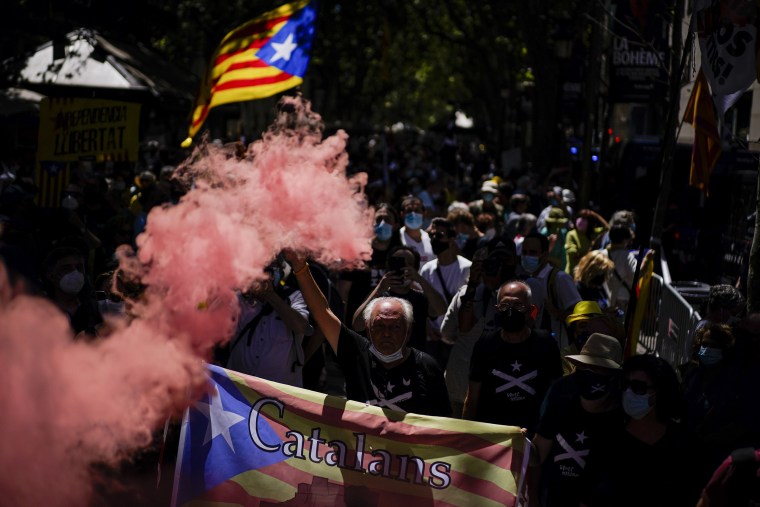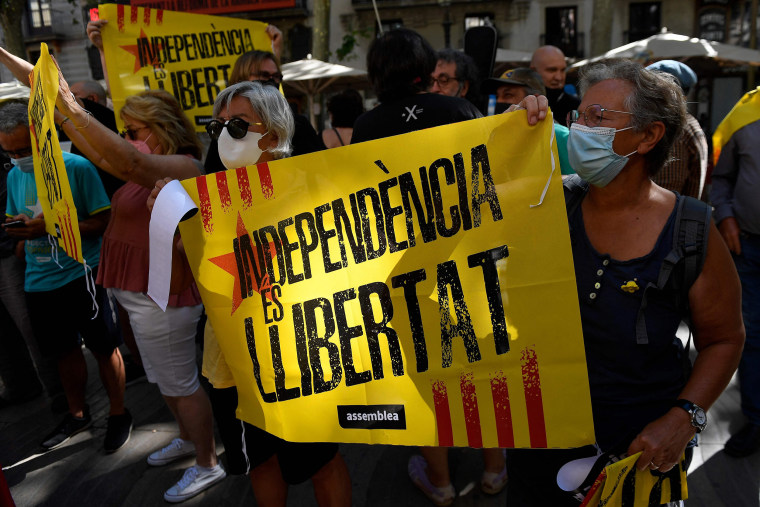BARCELONA — Spanish Prime Minister Pedro Sanchez said his government will pardon the nine jailed leaders of Catalonia's failed 2017 independence bid on Tuesday, saying that seeking reconciliation with the region was in the public interest.
But as Sanchez spoke of hopes for "a spirit of dialogue and concord", separatist protesters in Barcelona clamored for a new referendum on independence and opposition parties in Madrid threatened to challenge the pardons in court.
"To reach an agreement, someone must make the first step. The Spanish government will make that first step now," Sanchez told an event in the Catalan capital attended by about 300 members of Catalan civil society but boycotted by its pro-independence government.
Opinion polls indicate that close to half of Catalonia's population want independence from Spain.
"Catalonia, Catalans we love you," Sanchez said in Catalan at the end of his speech in Barcelona's opera house.
Download the NBC News app for breaking news and politics
But the move could be unpopular and risky.
Polls suggest about 60 percent of Spaniards are against freeing the politicians and activists. Opposition parties have said they will seek to reverse the pardons.
"Appeasement is not an option, it is only a postponement that grants new strength to the threat," conservative People's Party leader Pablo Casado said after Sanchez's announcement.
Government sources said Sanchez is betting he can use an economic recovery and a successful Covid-19 vaccination program to ride out the ensuing tide of unpopularity and repair any collateral damage before national elections due in 2023.
His ultimate goal that may define his legacy is to weaken the independence push and resolve Spain's biggest political crisis in decades.
Spain's Supreme Court in 2019 sentenced the nine Catalan leaders for their role in an unauthorized independence referendum and a short-lived declaration of independence. Madrid responded at the time by imposing direct control over the region for seven months in 2017-2018.
They include Oriol Junqueras, the deputy head of Catalonia's government during the 2017 referendum, who was sentenced to 13 years in prison, and Raul Romeva, sentenced to 12 years for his role as Catalonia's foreign affairs chief.
"We don't expect that those seeking independence will change their ideals, but we expect [they] understand there is no path outside the law," Sanchez said.
Outside, several hundred separatists protested demanding a full amnesty, and one member of the audience interrupted Sanchez for a few seconds shouting "Independence".
"Pardons are a small thing, the truth is that they've taken our freedom of speech at all levels, we have our legitimate government in prison or in exile, and this is very serious in a democracy," said Quima Albalate, 61, one of the protesters.

Another called the pardons "a farce".
The cabinet is due to rubber-stamp the pardons at its meeting on Tuesday, which should lead to the separatists' release from jail a few days later.
Sanchez aims to kick-start negotiations between the central and regional government.
Catalonia's separatist head of government Pere Aragones said the pardons were a welcome first step to start a dialogue but considered them insufficient, vowing to push for a new, authorized referendum.
"The Spanish government corrects an unfair ruling by the Supreme Court," he told reporters, saying that voting is not a crime.
